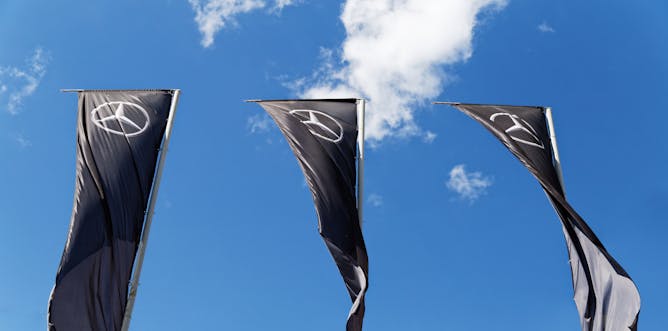|
Remember when the roads fell quiet early in the pandemic? People responded by taking to their bikes. Rates of cycling in Australia briefly rebounded from a long-term decline.
But it didn’t last. A new report, published today, shows the proportion of people who cycle has fallen to levels lower than in 2011.
If you’re not one of the 15% or so of people who cycle at least once a week, you might ask so what? But even if you never ride a bike, the decline in cycling is a worry.
Today, Mathew Mclaughin and Peter McCue present four reasons cycling matters: it’s part of the solution to the interrelated problems of transport emissions and climate change, public health, road safety, and traffic congestion. And they also propose three changes that will help drive a lasting resurgence of cycling in this country.
|

|
John Watson
Cities Editor and Deputy Energy + Environment Editor
|
|

Matthew Mclaughlin, The University of Western Australia; Peter McCue, UNSW Sydney
Early in the pandemic, when there was much less traffic on the roads, people took to their bikes. But since then, fewer people are cycling, with rates now lower than in 2011.
|

Michelle Grattan, University of Canberra
Like most governments, this one arrived in office promising more accountability and transparency. Also like others, in practice it has a penchant for control and secrecy.
|

Paul Williams, Griffith University
The once-popular Queensland premier is facing growing pressure to resign. How did Palaszczuk lose the public’s faith, and who could replace her?
|

Vishal Mehrotra, Bond University; Rajat Roy, Bond University
In a landmark case for the Australian automotive industry, the Federal Court has ruled Mercedes-Benz is free to set fixed prices and sell direct to customers, rather than let dealerships haggle.
|

Rico Merkert, University of Sydney
On its face, the decision to deny Qatar 21 flights into Australia suggests Australia is making decisions about international rights in order to protect the profit of an airline it hasn’t owned since 1995.
|

Shane Rogers, Edith Cowan University; Marc Hye-Knudsen, Aarhus University
Dad jokes can help make you a better parent. But that’s only one reason why dad jokes work.
|

Bhiamie Williamson, Monash University
For many Indigenous peoples, fathers can include extended family. ‘Emu men’ explores a new way for Indigenous father roles to be recognised in a way that celebrates this.
|

Grant Rigney, Indigenous Knowledge; Erin O'Donnell, The University of Melbourne; Fred Hooper, Indigenous Knowledge; Lana D. Hartwig, Griffith University
Once again, First Nations in the Murray-Darling Basin have been shortchanged in water reform and shortchanged in the water market. It’s time to listen and actually deliver tangible outcomes.
|

Anna Clark, University of Technology Sydney
Across the continent, diverse, adaptable fishing practices, recipes and rituals were a cornerstone of Indigenous life at the time of first contact – and many remain so to this day.
|
Politics + Society
|
-
Xanthe Mallett, University of Newcastle
These ‘custodial killers’ are often healthcare workers who murder helpless or dependent people in their care.
-
Julia Quilter, University of Wollongong; Luke McNamara, UNSW Sydney
While there have been significant improvements in the way complainants in particularly are dealt with in court cases, some old myths and stereotypes persist.
|
|
Health + Medicine
|
-
Gordon Parker, UNSW Sydney; Michael Spoelma, UNSW Sydney
Psychiatrists rely on guidelines to prescribe medication for bipolar disorders. But beyond side-effects and clinical trials, ‘real-world’ effectiveness should be considered thoughtfully.
|
|
Science + Technology
|
-
Leigh Signal, Massey University
A sleep scientist explains how to maximise your chances of getting decent rest while trapped on a plane.
|
|
Environment + Energy
|
-
Tony Wood, Grattan Institute
Australia’s grid will likely get through this angry summer without falling to pieces. But our market operator is worried about the summers after that.
-
Xinyu Fu, University of Waikato; Iain White, University of Waikato; Rob Bell, University of Waikato; Silvia Serrao-Neumann, University of Waikato
New or improved flood protection can give a false sense of security – the so-called ‘levee effect’. But climate change is unpredictable, meaning ‘residual risk’ always exists and must be planned for.
|
|
Education
|
-
Matt McGuire, Western Sydney University; Catharine Coleborne, University of Newcastle
A ‘knowledge economy’ is an economy based on technical and scientific advances. The upcoming Universities Accord should focus more on research and capitalising on discoveries.
|
|
Arts + Culture
|
-
Grace McQuilten, RMIT University; Chloë Powell, RMIT University; Jenny Lye, The University of Melbourne; Kate MacNeill, The University of Melbourne; Marnie Badham, RMIT University
Any policy interventions from Creative Australia to support visual and craft artists’ incomes will need to take a sector-wide approach.
-
Jodi McAlister, Deakin University; Athena Bellas, The University of Melbourne
Erotica and pornography are huge in the audio space, with stories about intimate, emotionally-charged sexual encounters designed to create a sense of closeness between speakers and listeners.
|
|
| |
|
|
|
Auckland University of Technology
Auckland, New Zealand
•
Full Time
|

|
|
Auckland University of Technology
Auckland, New Zealand
•
Full Time
|

|
|
The Conversation AU
Melbourne VIC, Australia
•
Full Time
|

|
|
|
|
| |
| |

|
| |
| |
| |
Featured Events, Courses & Podcasts
|
View all
|
|
6 July - 6 October 2023
•
|

|
4 - 8 September 2023
•
Carlton
|

|
15 - 17 September 2023
•
Sydney
|

|
13 September - 11 October 2023
•
Melbourne
|

|
|
|
|
| |
| |
| |
| |
| |
|
|